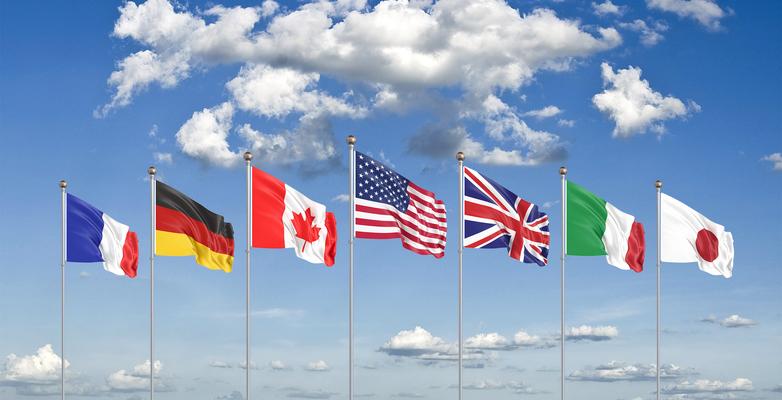
What the G7 Summit and Bonn Talks Tell Us About This Climate Moment
Halfway to critical talks at COP 29 and election year jitters have the leaders of major economies holding the line in statements but hesitating on numbers and substance.
7 min read
Key Takeaways
- There is no path to 1.5 degrees without a global transition away from fossil fuels – and there is no global transition without major financial support for developing nations.
- Setting a goal for the climate finance to drive this transition worldwide is a major goal at this year’s COP 29 climate summit in Baku in November.
- Last week, UN climate talks in Bonn to draft a goal for COP 29 broke down when developed countries refused to put a number on the table.
- The same week, leaders of the G7 group of wealthy democracies affirmed their commitment to transitioning away from fossil fuels but offered few specifics.
- Rich countries turning statements into implementation plans and real finance for vulnerable nations may determine the success or failure of COP 29 – and international climate efforts writ large.
So they all punted. Again.
If there is one clear takeaway from last week’s G7 summit of major economies and UN climate talks in Bonn taken together, it’s that – by and large – everyone can agree that finding the finance for developing nations to transition to clean energy is critical to the world meeting our Paris Agreement goals and holding warming to 1.5 degrees C.
What they can’t agree on, however, is how much finance we’re talking about and exactly where it will come from.
The two sets of talks unfolding in sequence – one between leaders of the world’s wealthy democracies and EU joined by India, Brazil, and others; one between the negotiating teams of the nearly 200 parties to the Paris Agreement – laid bare the extraordinary challenge of making progress on finance in a moment defined by two irreconcilable truths.
developing nations are counting on climate finance
On one hand, developing nations – rightly simmering at being largely left to twist in the Category 5-strength winds unleashed by wealthy country emissions – are looking to their developed counterparts for the financing to join the global climate fight and build their economies with clean energy.
As Ugandan negotiator and G77 and China chair Adonia Ayebare told Carbon Brief, “Without finance, there’s nothing that can happen from a developing country’s perspective . . . It’s in the Paris Agreement. We agreed on it, so we should do it.”
With developing nations projected track to generate as much as half of global emissions by 2030 without this support, the ability of wealthy countries to not only make good on longstanding commitments to climate finance but go beyond could make or break global climate efforts.
A new report from the International Energy Agency (IEA) lays out the numbers. Investments in clean energy technologies are on track to reach a staggering $2 trillion this year. The trouble for global climate efforts is that this investment – and the transition it enables –is highly concentrated in a few developed countries and China.
To keep 1.5 degrees even in sight, this needs to change. Fast. As the IEA notes, referring to emerging markets and developing economies (EMDE), “Meeting COP 28 goals requires a doubling of investments by 2030 worldwide, and a quadrupling in EMDE outside China” (emphasis ours).
donor nations face headwinds at home
The moral case is clear. The practical path less so.
Already, wealthy nations on the hook for much of this investment and finance have historically struggled to meet even existing commitments, only finally meeting their $100 billion climate finance pledge in 2022, two years late.
Worse, increasing this support will be a Herculean task in a year when many donor nation governments are still reeling from recent elections or looking anxiously at the calendar ahead.
After all, last week’s EU elections saw big wins for populist parties running opposed to Green Deal climate policies and major losses for the parties of two of Europe’s historic leaders, French President Emmanuel Macron and German Chancellor Olof Schultz, depriving both of any mandate.
Things only get more uncertain from there. French voters now head to the polls on June 30 for a snap parliamentary election that will inform how far Macron can go for the near term. British Prime Minister Rishi Sunak faces a general election of his own on July 4 and US President Joe Biden – already constrained on climate funding by a hostile Congress – only learns if he gets a second term in November.
In practice, the result was eloquence at the G7 and hesitation in Bonn.
The final statement emerging from the G7 certainly says all the right things, noting:
“We look forward to setting a new collective quantified goal on climate finance at COP29, and recognize that a new goal is a unique opportunity to strengthen the international climate finance landscape in this critical decade to keep 1.5°C within reach.”
This enthusiasm may have come as a surprise to observers at Bonn, who days before, had seen negotiating teams from G7 countries refuse to give even a draft number for that goal beyond the existing $100 billion per year.
This refusal came as a shock to many developing nations who’d come to Bonn expecting to begin laying the groundwork for exactly that number and goal in Baku. As PowerShift Africa director Mohamed Adow put it:
two different conversations
What fast became clear in Bonn is that the two sides arrived with fundamentally different perspectives, leading to two completely different conversations.
Developed nations seemingly arrived with a sense of their hands tied by voters and circumstances at home on the scale of direct public support they could offer. They came to explore alternative avenues including leveraging private finance and expanding the donor base to include wealthier emerging economies and petrostates like China and Saudi Arabia.
For developing nations, watching the billions mobilized to support COVID response or Ukraine, there is clearly money available to respond to crises. It’s just the political will that’s lacking.
As Michai Robertson, negotiator for the Alliance of Small Island States, told Reuters, “It seems like the money is always there when it’s a more ‘real’ national priority for the country. It’s really tough to see that.”
China’s negotiators went even further, snapping at the idea of expanding the climate finance donor base, telling diplomats, “We the developing countries, have no intention to make your number look good or be part of your responsibility, as we are doing all we can to save the world.”
The result: Talks intended to lay the groundwork for even more difficult discussions at COP 29 ended with little to show beyond deepening resentment between developed and developing worlds. As UN climate chief Simon Stiell noted, a finance agreement in Baku still possible, but with the clock ticking, countries now face, “a mountain to climb.”
Getting there, as Climate Reality International Director Ethan Spaner noted from Bonn, will take not only a new approach in negotiations but a new approach in practice.
“Trust is the real issue here. These forums are meant to build equity into our collective response to the climate crisis. Time and again we’ve seen that one actor stepping up and leading encourages others to follow. If developed countries want a larger contributor base for climate finance, they need to actually lead here. That means going beyond talking and actually implementing new and innovative ways to mobilize finance. I think it could surprise people how much space that opens up for more contributions.”
Some Silver Linings in Italy
After the breakdown in Bonn and political shift in the EU, G7 leaders had to produce something. If only to hold the line and staunch the bleeding out of all trust in international processes.
So it was notable that the final statement went one further than the agreement at COP 28 hailed as signaling the beginning of the end of fossil fuels, with leaders declaring:
“We will transition away from fossil fuels in energy systems in a just, orderly, and equitable manner, accelerating actions in this critical decade, to achieve net-zero by 2050 in keeping with the best available science. We will operationalize these commitments through the development and implementation of domestic plans, policies and actions, including to inform and be reflected in our NDCs and LTSs, and through intensive efforts to reduce demand for and use of fossil fuels.”
In a forum normally characterized by ambiguous language, the clarity here is striking. Not “commit to transition.” “Will transition.” We’ll take the win, even as a symbolic one.
Of course, critics will note that these communiques are eloquent, even inspiring, but rarely feature much in the way of action to back up what they say. And here, this G7 was no different. Worse, it even added gifts to the fossil fuel industry that will undoubtedly slow if not sabotage its stated goal.
Among others, G7 leaders added yet another loophole on phasing out coal and gave oil companies and petrostates the biggest gift of all by labeling gas a “transition fuel.”
Where we did see progress was in a reaffirmed commitment to phase out “inefficient” fossil fuel subsidies by 2025 and this time with an actual report on progress next year. Without clarity on what exactly “inefficient subsidies” are, dangerous wiggle room remains. But here – and with the statement’s reaffirmation of a 2035 target date to largely phase out fossil fuels from the electricity sector, there are pledges for advocates to hold their leaders to. The challenge now is to turn symbolic statements into practical roadmaps.
If there is any silver lining in the recent EU elections, it’s in the clear reminder that governments do respond to their constituents. Climate action has set the agenda for the EU before and it can again.
Beyond the EU, there is a truly hellish summer likely ahead for most of the Northern Hemisphere that will make the cost of continued punting abundantly clear to millions of G7 constituents. It’s up to us to turn clarity into pressure. We cannot waste the opportunity.
Take action: Tell G20 leaders to end the $1 trillion-plus giveaway to the fossil fuel industry.




